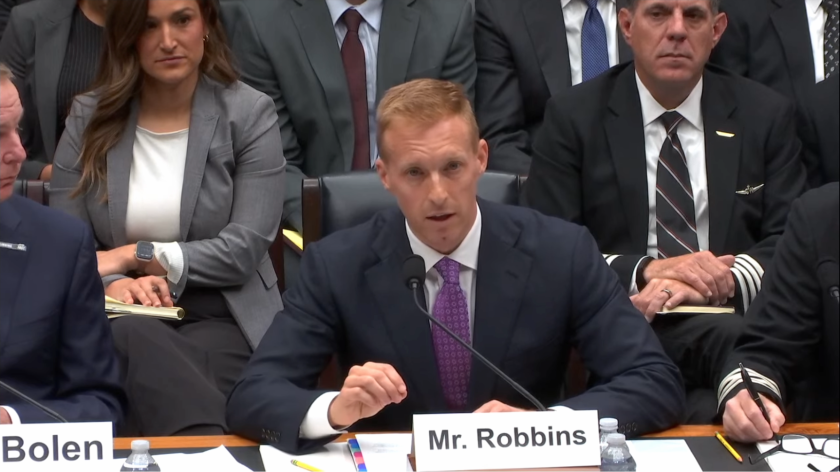Michael Robbins, President and CEO of the Association for Uncrewed Vehicle Systems International (AUVSI), testified yesterday before the House Committee on Transportation and Infrastructure’s Subcommittee on Aviation at a hearing titled “Federal Aviation Administration (FAA) Reauthorization Act of 2024: Stakeholder Perspectives One Year Later.”
During the hearing, Robbins shared the perspectives of AUVSI’s members, including leaders across the uncrewed aircraft systems (UAS), advanced air mobility (AAM), and autonomous technology sectors, on the status of implementing the FAA Reauthorization Act of 2024. He commended the bipartisan achievement of the legislation, calling it “a bold roadmap for the future of aviation,” and emphasised that “its impact on jobs, public safety, infrastructure, and global leadership and competitiveness depends entirely on how well and how quickly it is implemented.”
Robbins pointed to promising recent momentum from the FAA, particularly in granting waivers for beyond visual line of sight (BVLOS) operations. However, he cautioned that “these individual waivers are not a substitute for a comprehensive rule,” adding that the current case-by-case approach is delaying investment, operational planning and public benefit.
Section 930 of the 2024 law set deadlines to advance the long-awaited Part 108 BVLOS rule, but Robbins noted that “the first of those deadlines was missed by 261 days, as of today – yes we are counting, every day matters.” He urged immediate release of the draft rule, which is currently under review at the White House, and emphasised the need to keep the process moving. “Perfect should not be the enemy of the good,” he said, “and instead, progress should continue to be made in the process allowing industry, government, and other stakeholders an opportunity to review the draft and offer feedback.”
Robbins also pressed for final action on long-overdue regulatory mandates such as Section 2209 of the 2016 FAA Extension Act—reaffirmed in Section 929 of the 2024 law—which directs the FAA to create a process for critical infrastructure operators to petition for drone flight restrictions near sensitive sites.
In addition, Robbins highlighted the importance of implementing Section 906, which instructs the FAA to evaluate and adopt electronic conspicuity technologies—low-power, low-cost broadcast solutions that improve situational awareness in lower-altitude airspace. “These technologies offer an immediate and scalable path to close that gap,” he said, adding, “we believe universal electronic conspicuity is a cornerstone of safe integration.”
The 2024 FAA Reauthorization Act also includes critical provisions to advance the advanced air mobility (AAM) sector. Section 952 affirms Congress’s intent for the United States to establish itself as a global leader in AAM and directs the FAA to work collaboratively with manufacturers, prospective operators, and other relevant stakeholders to ensure the safe integration of AAM aircraft into the national airspace system. AUVSI says the AAM industry has proven its operational readiness through real-world missions nationwide, but excessive and under-resourced FAA oversight of aircraft certification has overwhelmed the agency and created significant delays.
Robbins closed his testimony with a call to action: “With your continued oversight and support, the United States can remain the global leader in uncrewed and autonomous aviation—where safety, security, innovation, and opportunity all take flight together.”
For more information
Image: Robbins testifies at the House Committee on Transportation and Infrastructure’s Subcommittee on Aviation hearing.




